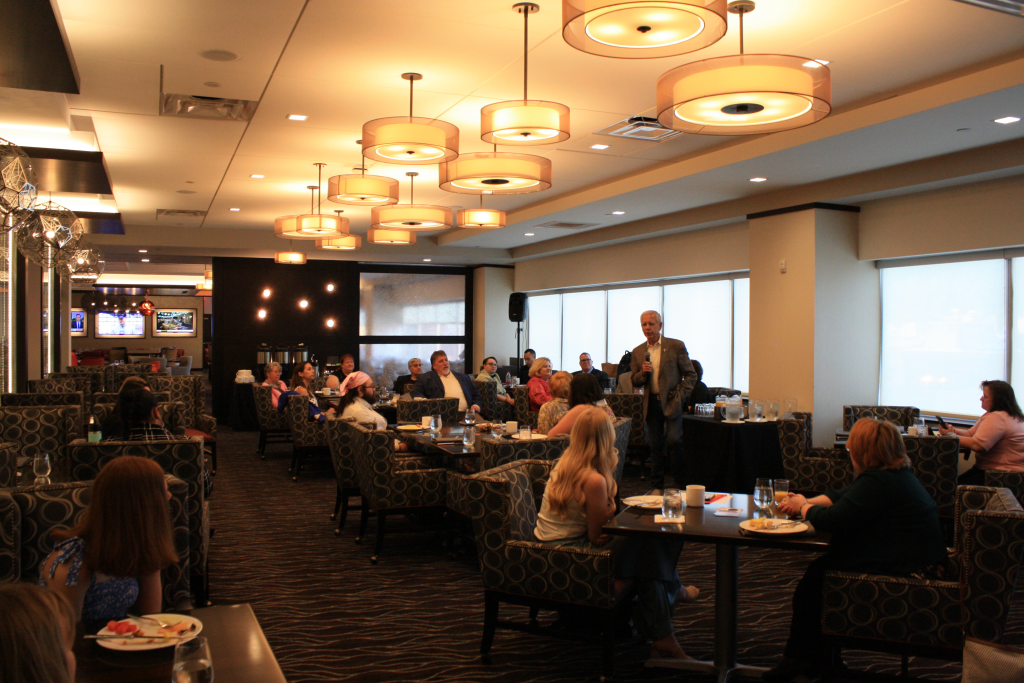On June 1st, we kicked-off PRIDE celebrations in Pittsburgh by hosting a breakfast which explored the intersectionality of LGBTQ+ and disability. At the event, Tony Coelho, former Congressman and author of the Americans with Disabilities Act, talked about his personal experiences as a gay man living with disability and led a questions and answers session about the intersectionality of the LGBTQ+ and disability experience. Joining Tony, were guest speakers from our programs, including DigitalAccess@Work alumnus, Asher Jordan, and Education2Employment worksite trainer, Resse Feda.
At the Bender Leadership Academy, we know that disability intersects with all other cultural and affinity groups, including individuals within the LGBTQ+ community. Over the years we have experienced several young people who have come out in our classes and shared their experiences as people living with disabilities who are also LGBTQ+. Once in an environment where they were accepted and safe, these young people not only thrived, but became more willing to embrace their full selves.
“When I look into the mirror, a year into taking testosterone, I don’t understand the violence or hate. Rather, I see someone I love, that I’m proud of. I see someone I have never known before, but I wish that I had gotten to know as a kid.” – Asher Jordan, Bender Leadership Academy Alumnus
When we launched the #NotAshamed campaign last June, we knew that intersectionality was an important component to addressing mental health stigma. So many people who experience discrimination, hatred, and exclusion; people who are bullied, who are stigmatized, and who are victims of violence end up experiencing mental health concerns. In fact, members of the LGBTQ+ and Disability communities are two of the groups most bullied in schools. Bullying has been linked to low self-esteem, increased suicidal ideation, and low self-efficacy – all things which can lead to or exasperate mental health disabilities such as depression, PTSD, and anxiety.
“There is a distinct intersectionality between the disability community and the queer community. My favorite quote from Disability rights activist Patricia Deegan, “people need to have the dignity of risk, and the right to fail,” this has become my mantra while developing programming and coaching incredible students. That quote is a beautiful description of our fight as queer and disabled individuals.” – Reese Feda
Like mental health disability, members of the LGBTQ+ community know what it is like to be told to hide their true selves from others, propagating a sense of shame from generation to generation. When you can’t count on the people who should protect you from harm, regardless of your disability, gender-identity, or who you love, whether this be your parents, your school, or your government, it promotes feelings of isolation, fear, and feelings of self-stigmatization.
“The bisexual nonbinaries who are in cis-passing relationships being told to mask their identities. All of us being told not to shove our identities in people’s faces as we receive invites to gender reveal parties. I should get one of those. What I get is “Can you go by your deadname at my house? It might be confusing.” Members of my own community refuse to learn. Refusing to admit they don’t think before they speak. That quiet admittance that they don’t find validity in my identity.” – Resse Feda
Perhaps this is why the Disability and LGBTQ+ communities also have also shared a sense of cooperation and support for each other’s journey toward finding their inner PRIDE and continuing to advocate for their rights in a climate where civil rights gained are currently in jeopardy. Together we are stronger, and we can stand against hatred together, as we have in the past, and as we will against the oppressive climate of today. Through REV UP PA and Valerie Jarrett Community Engagement curriculum, we teach our young advocates about the civil rights issues of today, how to influence and support legislation that values our rights, the importance of voting, and how to raise our voices in unity to fight for what is important.
“Let’s not forget that disabled individuals have always been involved when it comes to queer rights. We can’t forget that both were thrown away by society in the nineteen hundreds as being broken and unwanted. God forbid we ever forget the way that the AIDS crisis ripped through our community, and how we took care of each other when the President of the United States laughed at the deaths of our brothers and sisters. Don’t forget how there was the Rainbow Alliance of the Deaf, the Womyn’s Braille Press for lesbian and feminist literature made available for the blind, Connie Panzarino organizing the first Disabled Lesbian Conference, or the 2002 first Queer Disability Conference in San Francisco, California. Don’t forget the ramps that we built, that created accessibility for every intersectionality at Pride.” – Asher Jordan
It is our hope that someday our students won’t have to live in a world that undervalues and dismisses the contributions they have to offer. In the meantime, we will continue to do what we can to instill in our students the understanding that they are awesome and that they have a lot to contribute – in our schools, in our communities, and in our workplaces. Every day, we raise the bar, and our students work to not only reach it, but surpass it. Having, or not having a disability, doesn’t determine your value – it is your actions and what you do to make this world a better place for all the people in it.
“It is our responsibility to fight against ignorance through education. The telling of our stories.” – Resse Feda
